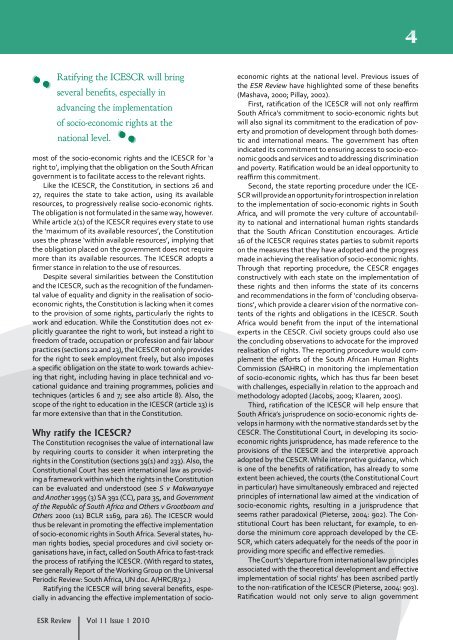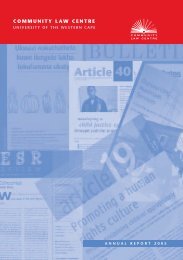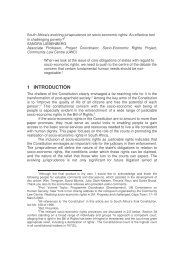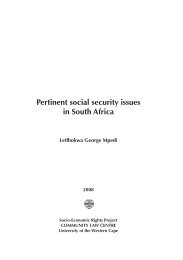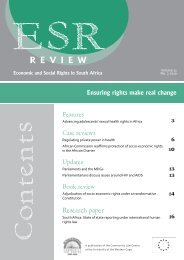ESR Review Volume 11 No 1 - January 2010 - Community Law Centre
ESR Review Volume 11 No 1 - January 2010 - Community Law Centre
ESR Review Volume 11 No 1 - January 2010 - Community Law Centre
You also want an ePaper? Increase the reach of your titles
YUMPU automatically turns print PDFs into web optimized ePapers that Google loves.
4<br />
‘<br />
‘<br />
Ratifying the ICESCR will bring<br />
several benefits, especially in<br />
advancing the implementation<br />
of socio-economic rights at the<br />
national level.<br />
‘<br />
‘<br />
most of the socio-economic rights and the ICESCR for ‘a<br />
right to’, implying that the obligation on the South African<br />
government is to facilitate access to the relevant rights.<br />
Like the ICESCR, the Constitution, in sections 26 and<br />
27, requires the state to take action, using its available<br />
resources, to progressively realise socio-economic rights.<br />
The obligation is not formulated in the same way, however.<br />
While article 2(1) of the ICESCR requires every state to use<br />
the ‘maximum of its available resources’, the Constitution<br />
uses the phrase ‘within available resources’, implying that<br />
the obligation placed on the government does not require<br />
more than its available resources. The ICESCR adopts a<br />
firmer stance in relation to the use of resources.<br />
Despite several similarities between the Constitution<br />
and the ICESCR, such as the recognition of the fundamental<br />
value of equality and dignity in the realisation of socioeconomic<br />
rights, the Constitution is lacking when it comes<br />
to the provision of some rights, particularly the rights to<br />
work and education. While the Constitution does not explicitly<br />
guarantee the right to work, but instead a right to<br />
freedom of trade, occupation or profession and fair labour<br />
practices (sections 22 and 23), the ICESCR not only provides<br />
for the right to seek employment freely, but also imposes<br />
a specific obligation on the state to work towards achieving<br />
that right, including having in place technical and vocational<br />
guidance and training programmes, policies and<br />
techniques (articles 6 and 7; see also article 8). Also, the<br />
scope of the right to education in the ICESCR (article 13) is<br />
far more extensive than that in the Constitution.<br />
Why ratify the ICESCR<br />
The Constitution recognises the value of international law<br />
by requiring courts to consider it when interpreting the<br />
rights in the Constitution (sections 39(1) and 233). Also, the<br />
Constitutional Court has seen international law as providing<br />
a framework within which the rights in the Constitution<br />
can be evaluated and understood (see S v Makwanyaye<br />
and Another 1995 (3) SA 391 (CC), para 35, and Government<br />
of the Republic of South Africa and Others v Grootboom and<br />
Others 2000 (<strong>11</strong>) BCLR <strong>11</strong>69, para 26). The ICESCR would<br />
thus be relevant in promoting the effective implementation<br />
of socio-economic rights in South Africa. Several states, human<br />
rights bodies, special procedures and civil society organisations<br />
have, in fact, called on South Africa to fast-track<br />
the process of ratifying the ICESCR. (With regard to states,<br />
see generally Report of the Working Group on the Universal<br />
Periodic <strong>Review</strong>: South Africa, UN doc. A/HRC/8/32.)<br />
Ratifying the ICESCR will bring several benefits, especially<br />
in advancing the effective implementation of socioeconomic<br />
rights at the national level. Previous issues of<br />
the <strong>ESR</strong> <strong>Review</strong> have highlighted some of these benefits<br />
(Mashava, 2000; Pillay, 2002).<br />
First, ratification of the ICESCR will not only reaffirm<br />
South Africa’s commitment to socio-economic rights but<br />
will also signal its commitment to the eradication of poverty<br />
and promotion of development through both domestic<br />
and international means. The government has often<br />
indicated its commitment to ensuring access to socio-economic<br />
goods and services and to addressing discrimination<br />
and poverty. Ratification would be an ideal opportunity to<br />
reaffirm this commitment.<br />
Second, the state reporting procedure under the ICE-<br />
SCR will provide an opportunity for introspection in relation<br />
to the implementation of socio-economic rights in South<br />
Africa, and will promote the very culture of accountability<br />
to national and international human rights standards<br />
that the South African Constitution encourages. Article<br />
16 of the ICESCR requires states parties to submit reports<br />
on the measures that they have adopted and the progress<br />
made in achieving the realisation of socio-economic rights.<br />
Through that reporting procedure, the CESCR engages<br />
constructively with each state on the implementation of<br />
these rights and then informs the state of its concerns<br />
and recommendations in the form of ‘concluding observations’,<br />
which provide a clearer vision of the normative contents<br />
of the rights and obligations in the ICESCR. South<br />
Africa would benefit from the input of the international<br />
experts in the CESCR. Civil society groups could also use<br />
the concluding observations to advocate for the improved<br />
realisation of rights. The reporting procedure would complement<br />
the efforts of the South African Human Rights<br />
Commission (SAHRC) in monitoring the implementation<br />
of socio-economic rights, which has thus far been beset<br />
with challenges, especially in relation to the approach and<br />
methodology adopted (Jacobs, 2009; Klaaren, 2005).<br />
Third, ratification of the ICESCR will help ensure that<br />
South Africa’s jurisprudence on socio-economic rights develops<br />
in harmony with the normative standards set by the<br />
CESCR. The Constitutional Court, in developing its socioeconomic<br />
rights jurisprudence, has made reference to the<br />
provisions of the ICESCR and the interpretive approach<br />
adopted by the CESCR. While interpretive guidance, which<br />
is one of the benefits of ratification, has already to some<br />
extent been achieved, the courts (the Constitutional Court<br />
in particular) have simultaneously embraced and rejected<br />
principles of international law aimed at the vindication of<br />
socio-economic rights, resulting in a jurisprudence that<br />
seems rather paradoxical (Pieterse, 2004: 902). The Constitutional<br />
Court has been reluctant, for example, to endorse<br />
the minimum core approach developed by the CE-<br />
SCR, which caters adequately for the needs of the poor in<br />
providing more specific and effective remedies.<br />
The Court’s ‘departure from international law principles<br />
associated with the theoretical development and effective<br />
implementation of social rights’ has been ascribed partly<br />
to the non-ratification of the ICESCR (Pieterse, 2004: 903).<br />
Ratification would not only serve to align government<br />
<strong>ESR</strong> <strong>Review</strong> Vol <strong>11</strong> Issue 1 <strong>2010</strong>


